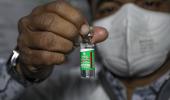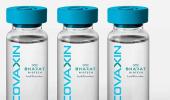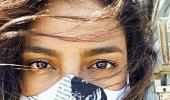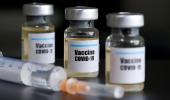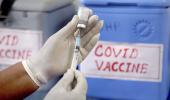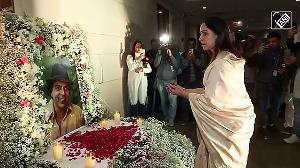Prime Minister Narendra Modi on Saturday launched India's COVID-19 vaccination drive while reassuring the country that emergency use authorisation was given to two made in India vaccines only after scientists were convinced of their safety and effectiveness, and urged people to beware of propaganda and rumours.
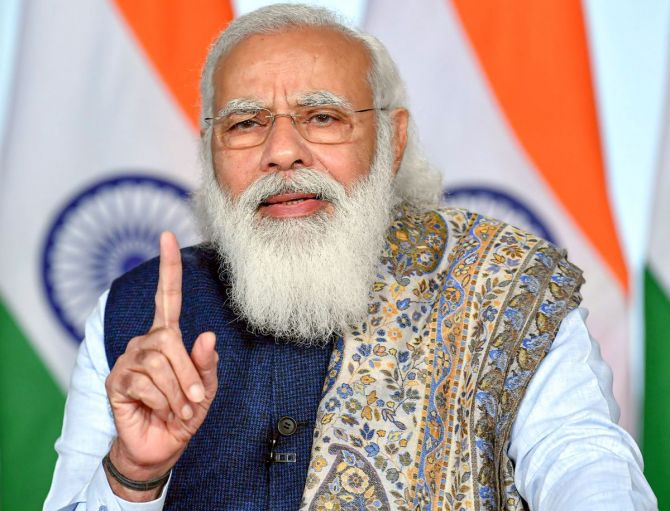
Addressing the nation ahead of the launch of what he described as the world's largest vaccination programme, Modi said these vaccines will ensure a "decisive victory" for the country over the coronavirus pandemic, but asked countrymen to continue wearing masks and maintain social distancing even after receiving the jabs.
Emphasising the enormity of the vaccination drive, which he launched through a remote control amid chanting of Sanskrit shloka that meant 'let everybody be happy, let everybody be healthy', Modi said never before in history, has this type of a large-scale vaccination campaign been undertaken.
There are more than 100 countries in the world whose population is less than three crore and India is vaccinating three crore people in its first phase of vaccination, he said.
In the second phase, the number of those vaccinated has to be taken to 30 crore, Modi said, pointing out that only two countries other than India have a population in excess of 30 crore -- the US and China.
The Prime Minister said that those who are elderly, are suffering from serious illness, will get vaccinated in the second stage.
"Dawai bhi, kadai bhi (vaccine also and strict discipline also)" should be the mantra going forward, he said.
"I want to remind people of the country that two doses of the Corona vaccine are very important. Don't commit the mistake that you take one dose and forget the second one. As experts have been saying, there will be a gap of about one month between the two doses," Modi said.
He asked people not to let their guard down even after taking the vaccine as only two weeks after taking the second dose, human body will develop necessary immunity against the virus.
During his speech, the prime minister also turned emotional as he spoke of the disruption the pandemic caused to people's lives, isolating victims of the coronavirus and denying the dead traditional last rites.
In a choked voice, the Prime Minister also referred to sacrifices made by healthcare and frontline workers, hundreds of whom lost their lives to the viral infection.
The Drugs Controller General of India had earlier this month approved Oxford COVID-19 vaccine Covishield, manufactured by the Serum Institute, and indigenously developed Covaxin of Bharat Biotech for restricted emergency use in the country, paving the way for the massive inoculation drive.
Modi also reassured the country about the safety and effectiveness of the vaccines given approval by India for restricted emergency use.
"I want to tell the people of the country that only when our scientists and experts were convinced about the safety and effectiveness of both the made-in-India vaccines, only then they gave permission for their emergency use. That is why the people of the country should beware of any type of propaganda, rumours and misinformation," he said.
"Our vaccine scientists, our medical system and the process India follows holds a lot of credibility in the world...we have won this confidence due to our track record," Modi said.
His remarks come amid apprehensions being raised by opposition leaders, including some senior Congress leaders, about the process of approval to the Bharat Biotech vaccine.
"Indian vaccines compared with foreign vaccines are much cheaper and their use is also very easy. Even one dose of some foreign vaccines costs Rs 5000 and have to be kept at minus 70 degrees Celsius, while the Indian vaccines have been made with such technology that is tried and tested," Modi said.
These vaccines, from storage to transportation, are suited to Indian conditions, he said.
"These (made-in-India) vaccines will ensure a decisive victory for India against coronavirus," he asserted.
"India begins the world's Largest Vaccine Drive. This is a day of pride, a celebration of the prowess of our scientists and hardwork of our medical fraternity, nursing staff, police personnel and sanitation workers," Modi said in a tweet after the launch of the drive.
In his remarks at the launch event, Modi also urged the country to show patience during the vaccination drive as it had shown till now in fighting the pandemic.
Normally, it takes years to make a vaccine but in such a short span of time, not one, but two 'made in India' vaccines are ready, Modi said, adding work on other vaccines is also progressing at a fast pace.
India getting two vaccines in such a short time is a testimony to the country's capability, scientific efficiency and talent, the Prime Minister said.
"Our vaccination programme is driven by humanitarian concerns, those exposed to maximum risk will get priority," he said.
In its fight against the pandemic, India took right decisions at the right time while keeping a vigil round the clock, he asserted.
On January 30, the first case of coronavirus was found in India, but even more than two weeks before that India had formed a high level committee, he said.
The country had issued its first advisory on January 17 and India was among first few nations that started screening at airports, Modi said emphasising the speed at which India acted to deal with the pandemic.
Modi also talked about evacuation of Indians stuck abroad, saying that at a time when many countries of the world had left their citizens stranded in China, India evacuated not only Indians but citizens of other countries.
The Prime Minister congratulated the countrymen for passing the challenge of discipline and patience during the 'Janata Curfew' in March.
He pointed out that the exercise prepared the country psychologically for the lockdown. Morale of the country was kept high with the campaigns like 'taali-thali' and lighting of diyas, the Prime Minister added.
Asserting that India's response to the crisis has been acknowledged globally, Modi said it was an example of the integrated and unified response from centre, states, local governments, government offices, social bodies who performed efficiently in unison.
According to the government, the shots will be offered first to an estimated one crore healthcare workers, and around two crore frontline workers, and then to persons above 50 years of age, followed by persons younger than 50 years of age with associated comorbidities.
Cost of vaccination of healthcare and frontline workers will be borne by the central government.
